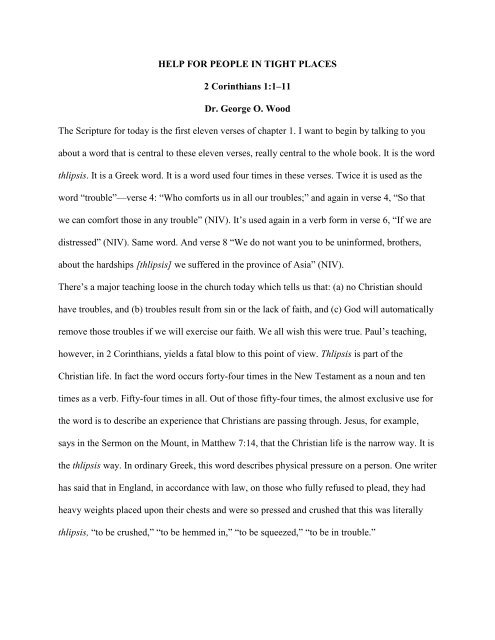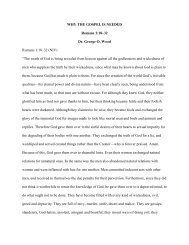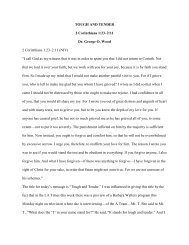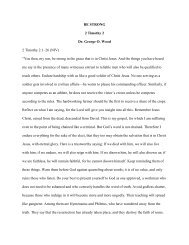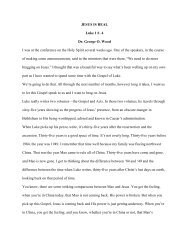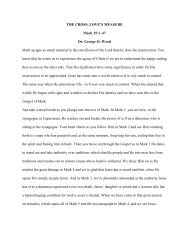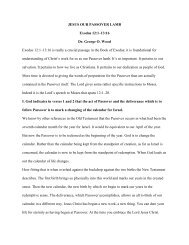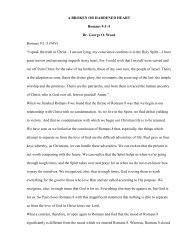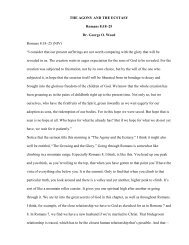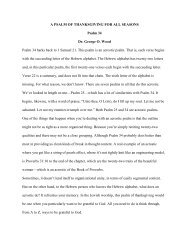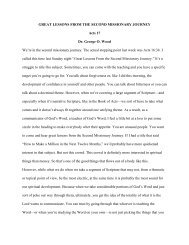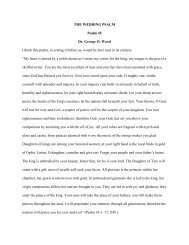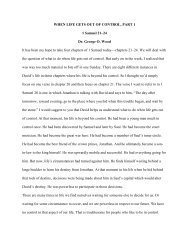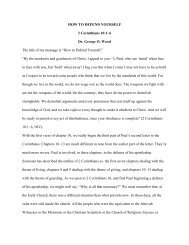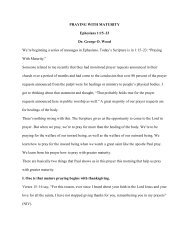01 HELP FOR PEOPLE IN TIGHT PLACES.pdf - Dr. George O. Wood
01 HELP FOR PEOPLE IN TIGHT PLACES.pdf - Dr. George O. Wood
01 HELP FOR PEOPLE IN TIGHT PLACES.pdf - Dr. George O. Wood
You also want an ePaper? Increase the reach of your titles
YUMPU automatically turns print PDFs into web optimized ePapers that Google loves.
<strong>HELP</strong> <strong>FOR</strong> <strong>PEOPLE</strong> <strong>IN</strong> <strong>TIGHT</strong> <strong>PLACES</strong><br />
2 Corinthians 1:1–11<br />
<strong>Dr</strong>. <strong>George</strong> O. <strong>Wood</strong><br />
The Scripture for today is the first eleven verses of chapter 1. I want to begin by talking to you<br />
about a word that is central to these eleven verses, really central to the whole book. It is the word<br />
thlipsis. It is a Greek word. It is a word used four times in these verses. Twice it is used as the<br />
word ―trouble‖—verse 4: ―Who comforts us in all our troubles;‖ and again in verse 4, ―So that<br />
we can comfort those in any trouble‖ (NIV). It’s used again in a verb form in verse 6, ―If we are<br />
distressed‖ (NIV). Same word. And verse 8 ―We do not want you to be uninformed, brothers,<br />
about the hardships [thlipsis] we suffered in the province of Asia‖ (NIV).<br />
There’s a major teaching loose in the church today which tells us that: (a) no Christian should<br />
have troubles, and (b) troubles result from sin or the lack of faith, and (c) God will automatically<br />
remove those troubles if we will exercise our faith. We all wish this were true. Paul’s teaching,<br />
however, in 2 Corinthians, yields a fatal blow to this point of view. Thlipsis is part of the<br />
Christian life. In fact the word occurs forty-four times in the New Testament as a noun and ten<br />
times as a verb. Fifty-four times in all. Out of those fifty-four times, the almost exclusive use for<br />
the word is to describe an experience that Christians are passing through. Jesus, for example,<br />
says in the Sermon on the Mount, in Matthew 7:14, that the Christian life is the narrow way. It is<br />
the thlipsis way. In ordinary Greek, this word describes physical pressure on a person. One writer<br />
has said that in England, in accordance with law, on those who fully refused to plead, they had<br />
heavy weights placed upon their chests and were so pressed and crushed that this was literally<br />
thlipsis, ―to be crushed,‖ ―to be hemmed in,‖ ―to be squeezed,‖ ―to be in trouble.‖
<strong>HELP</strong> <strong>FOR</strong> <strong>PEOPLE</strong> <strong>IN</strong> <strong>TIGHT</strong> <strong>PLACES</strong><br />
2 Corinthians 1:1–11<br />
In the kingdom parables, in Matthew 13:21, Jesus talks about one type of soil on whom the word<br />
falls. He says when thlipsis or persecution comes because of the Word, he quickly falls away.<br />
That is to say, when a person comes to the Lord on the basis that everything is going to be great<br />
and the Lord has promised us Disneyland and we find out it isn’t Disneyland at times at all, then<br />
on account of thlipsis or hardships, that person falls away.<br />
Jesus says in the Upper Room, in John 16:33, ―In this word you will have thlipsis [You will be<br />
hemmed in, straightened, squeezed, buffeted against. In this world you will have this]. But take<br />
heart. I have overcome the world.‖<br />
There are really two reasons for thlipsis, two root reasons. One is our linkage to Adam. That<br />
accounts for a lot of things, like a bald head and failing to hear and poor eyesight and all kinds of<br />
things that go wrong with us internally. It’s part of the genetic effect on the human race because<br />
of the sin of Adam. That’s one linkage of thlipsis that we have through Adam. But the other<br />
linkage is through Christ. Sometimes we suffer hardship simply because we’ve identified with<br />
Jesus. Think for a moment of the Christians in China who are enduring suffering for no other<br />
reason except that they are linked to Jesus. Maybe in this room some of you have taken a stand<br />
as a Christian which has brought you into disfavor with other persons. The only reason why<br />
you’re in disfavor and in the out group is because you’ve chosen to stand with the Lord. It’s not<br />
because of the way you look. It isn’t because of anything in your background, other than Jesus.<br />
This thlipsis, this hardship, can be external or internal. It can come against us or it can be<br />
something we suffer in our own spirit.<br />
When we look at Paul’s second letter to the Corinthians, we find that his being straightened or<br />
pressed or squeezed results from two things. It results, externally, from the Corinthians<br />
themselves. Paul says in verse 4 that the Lord comforts us in all of our troubles. Certainly the<br />
2
<strong>HELP</strong> <strong>FOR</strong> <strong>PEOPLE</strong> <strong>IN</strong> <strong>TIGHT</strong> <strong>PLACES</strong><br />
2 Corinthians 1:1–11<br />
Corinthians had been a massive source of pressure upon the heart of the apostle Paul. The church<br />
had been founded through his missionary efforts, as the Holy Spirit had enabled him to do it. But<br />
there were many in that congregation who were spiritually smug and resentful of authority. And<br />
they liked people who were super-apostles, who didn’t talk about pain and suffering and<br />
hardship and loyalty to Jesus. They liked to talk about earning your standing with God rather<br />
than being justified by faith. They looked down on Paul and they resented his authority. Paul<br />
tells us, in 2 Corinthians 2:1 and 12:14, that he had to give them a painful visit. And even after<br />
that, he had to write them a severe letter (2 Corinthians 2).<br />
The only people that have the power to cause us heartaches are the people we love. The only<br />
people that have power to make us feel squeezed are people we care about. I’ve said before, ―It’s<br />
not the guy that I honk my horn at, that cuts in front of me on the freeway, that I am upset with<br />
for long. I forget about him. He means nothing to me, in the sense that we have no relationship.<br />
The person that has the power to cause the squeeze in my life is the person I care about.‖ That is<br />
the source of thlipsis for Paul, and it may be for you.<br />
There was a second thing for Paul. That was a very dangerous situation he faced at Ephesus,<br />
where he spent three years after starting the church at Corinth. He talks, in verse 8, about his<br />
thlipsis in Asia. He had been under such great pressure and it seemed beyond his ability to<br />
endure. He despaired of life. He felt the sentence of death. Against that backdrop, he is writing<br />
now, having escaped a very dangerous time that seemed to threaten his very existence.<br />
I wouldn’t at all be surprised if there are persons in this congregation who feel like you have just<br />
come through a time that threatened your very existence as a person. Either physically or maybe<br />
even on a sanity level. You’ve gone through so much. You’ve marveled that you’ve been able to<br />
pass through that and hold together.<br />
3
<strong>HELP</strong> <strong>FOR</strong> <strong>PEOPLE</strong> <strong>IN</strong> <strong>TIGHT</strong> <strong>PLACES</strong><br />
2 Corinthians 1:1–11<br />
What help does God have for us I’ve called this message ―Help for People in Tight Places.‖<br />
Thlipsis describes people who are in tight places. What help does God have to offer us These<br />
first eleven verses of 2 Corinthians tell us four things that God has to offer to us as a help when<br />
we are in a tight place.<br />
The first thing may not seem so consequential to us, but I think it’s very important. And I think<br />
you’ll agree with me when we get done with it. That is simply this:<br />
I. In our tight places, God has given an apostle to speak to us.<br />
God has given an apostle to speak to us in our tight places. An apostle speaks as one who has<br />
direct authority from Jesus Christ. It is unfortunate that there are many in the body of Christ<br />
today that are undermining, like of old, the authority of Paul and saying, ―There are certain areas,<br />
as an apostle, in which he was deficient as well.‖ If I understand the Scriptures correctly, the<br />
meaning of apostleship implies that when an apostle takes up a pen to write, they are writing<br />
through the direct leading of the Spirit and under the authority of Jesus Christ. And what they are<br />
doing is God’s gift to the church. Ephesians 4:11–12: He gave gifts to the church. And the first<br />
gift that He gave was the gift of apostleship.<br />
Why did he do this That we might have a sure foundation for our faith; that when an apostle<br />
spoke, we might cast our anchor into that and say, ―That’s bedrock. You can build upon that.<br />
That’s true.‖<br />
That is the case with Paul. He writes as God’s gift to us. An apostle directly commissioned by<br />
the Lord. He introduces himself as he does in all of his letters, simply by the word ―Paul‖. We<br />
know his name was simply ―Saul‖ before he was converted. It was the Jewish name. I wonder if<br />
sometimes Saul didn’t have struggles with that because, like his ancient namesake, King Saul,<br />
4
<strong>HELP</strong> <strong>FOR</strong> <strong>PEOPLE</strong> <strong>IN</strong> <strong>TIGHT</strong> <strong>PLACES</strong><br />
2 Corinthians 1:1–11<br />
they were both from the tribe of Benjamin. But King Saul was an impressive young man without<br />
equal among the Israelites, a head taller than any other. He was a big, tall guy (1 Samuel 9:2).<br />
But the apostle Paul, or the biblical New Testament Saul, appears to be an unimpressive-looking<br />
kind of a guy. In fact, perhaps ―Paul‖ was his nickname, meaning ―the little one.‖ That’s what<br />
Paul means in the Greek. It was a name he came to use. In fact, early second-century tradition<br />
described Paul as a man small in size, baldheaded, bandy-legged, well-built, with eyebrows<br />
meeting, a rather long nose, full of grace, for sometimes he looked like a man and sometimes he<br />
had the countenance of an angel. Some people are mighty but not all that impressive in looks.<br />
We’re not to look at external things, anyway, but at the heart. He writes to us as ―Paul, an<br />
apostle,‖ through the will of God. He’d received his authority from Jesus. And we therefore<br />
receive that as coming from one who has authority.<br />
I found it possible in my life to endure tight places when there was a confidence that I was in the<br />
will of God, in the midst of that place. Paul says he is an apostle according to the will of God. An<br />
apostle of Christ Jesus, by the will of God. How good it is to know God in that kind of intimate<br />
way, where we can say, ―We are what we are by God’s will.‖ He introduces Timothy as his<br />
brother, not his servant. Neither does he introduce him as an apostle, for that he was not. ―To the<br />
church of God, God’s called out ones.‖ There’s no society like the church on earth. ―Grace and<br />
peace to you‖ (2 Corinthians 1:1). Always in that order—grace first. Not the grace that saves, but<br />
the grace that sustains us in our troubles. Not peace with God, which we have at salvation, but<br />
the peace of God which continues with us.<br />
I can give help to anyone in a tight place because, behind me, there is an authority—the authority<br />
of an apostle. And beyond that authority is the authority of Jesus. I would have no confidence in<br />
coming before you, Sunday after Sunday, or in any kind of teaching context, to simply get up<br />
5
<strong>HELP</strong> <strong>FOR</strong> <strong>PEOPLE</strong> <strong>IN</strong> <strong>TIGHT</strong> <strong>PLACES</strong><br />
2 Corinthians 1:1–11<br />
and give you good ideas. Stuff off the top of my head. Things that I had sort of researched out of<br />
my own experience or books. I only have confidence that behind me there is the Word of God. I<br />
believe that in our own life situations we can only have confidence if we know that behind us is<br />
the unchanging Word of God. That’s an encouragement—that when we speak on tight places, we<br />
have the authority of an apostle behind us.<br />
II. I believe the second help for people in tight places, coming out of these eleven verses, is<br />
that God brings us encouragement in our tight places.<br />
―Praise be to the God and Father of our Lord Jesus Christ, the Father of compassion and the God<br />
of all comfort, who comforts us [or encourages us] in all our troubles‖ (2 Corinthians 1:3–4,<br />
NIV). Often when we are down, our view of God changes. We say, ―Lord, why are You letting<br />
this happen to me Are You angry with me Why are You silent, Lord Why this disaster‖ We<br />
change, at that moment, our view of God, because the experience happening to us is a<br />
straightening, a pressurized experience. It’s important, therefore, in our life, to learn to<br />
distinguish between the subjective feeling and the objective reality. Paul here points us to the<br />
objective reality of God. The thing that’s true here about God, whether or not at that moment we<br />
may be feeling it, is that He is the God and Father of our Lord Jesus Christ.<br />
I say this periodically to persons in life who have grown up with poor earthly models of fathers<br />
and have a difficult time getting a hold of the understanding of God as Father. The easiest way to<br />
think of God as Father is to think of the God and Father of our Lord Jesus Christ. He is a<br />
wonderful Father. He’s the Father of all compassion. And He’s the God of all comfort.<br />
The word ―comfort‖ here, which the New International Version uses, is a word that in the Greek<br />
is used ten times in five verses. Between verses 3–7, this word is used ten times. It literally<br />
6
<strong>HELP</strong> <strong>FOR</strong> <strong>PEOPLE</strong> <strong>IN</strong> <strong>TIGHT</strong> <strong>PLACES</strong><br />
2 Corinthians 1:1–11<br />
means ―one called alongside to help.‖ The Holy Spirit himself is the comforter. Jesus is a<br />
comforter. He is one called alongside to help.<br />
There’s a tremendous difference between one simply called alongside and one called alongside<br />
to help. If you’re stuck by the freeway and someone simply stops the car and gets out and looks<br />
at what’s wrong with your car and doesn’t do anything, they may have come alongside you, but<br />
they haven’t come alongside you to help. The comforter is not one who simply puts his hand on<br />
your shoulder and says, ―I’m so sorry that that happened,‖ and then drives off. The comforter is<br />
one who offers assistance. In fact, the English word ―comfort‖ comes from the Latin, which<br />
means ―with bravery,‖ ―to give one person strength to stand.‖<br />
That is what God does for us. He encourages us. He gives us strength to stand when we are in<br />
our tight places. How does He do this I think Romans 8:18–39 presents to us four ways in<br />
which God encourages us when we’re in tight places. The Lord is telling us these four things in<br />
our tight places by which He will always bring us encouragement if we will let His Word<br />
encourage us:<br />
A. One is that the present suffering we are going through does not compare to the glory that’s<br />
coming. No matter how heavy the current load of suffering and agony and stress is, it cannot be<br />
compared to what God is going to do for us in the age to come.<br />
B. Secondly, in our times of tight places, the Spirit is interceding for us with words which cannot<br />
be uttered. The Spirit is praying through us according to the will of God, always praying through<br />
us, His people.<br />
C. The third thing that’s an encouragement is that God is working everything for the good in our<br />
lives. He’s going to bring it out for the good. It may not be good of itself, but He’s going to cause<br />
it to work for good in our lives<br />
7
<strong>HELP</strong> <strong>FOR</strong> <strong>PEOPLE</strong> <strong>IN</strong> <strong>TIGHT</strong> <strong>PLACES</strong><br />
2 Corinthians 1:1–11<br />
D. Fourthly, nothing can ever separate us from God. Least of all, trouble. The suffering of Christ,<br />
Paul says in 2 Corinthians, ―overflows in our life.‖ But so does His comfort. The Lord<br />
encourages us. Jesus has himself sat in our place. He has suffered. He knows what it is to be<br />
abandoned. To be betrayed, to be in pain, to be helpless, to be vulnerable, to be scorned, to be<br />
isolated. He has sat where we sat. And He has been astounded. ―But in the light of all this, we<br />
bless the Lord,‖ Paul says. ―At all times praise be to the God and Father of our Lord Jesus Christ<br />
who comforts us not in some of our troubles but in all of our troubles‖ (2 Corinthians 1:3-4).<br />
God is our encourager.<br />
III. A third great help in a time of stress and a tight place is that those times in our life<br />
produce endurance.<br />
Verse 6 says, ―If we are distressed, it is for your comfort and salvation; if we are comforted, it is<br />
for your comfort, which produces in you patient endurance‖ (NIV). That word simply means<br />
―staying power.‖ It is as you take Romans 5:3 and realize that adversity produces staying power.<br />
Endurance. And that makes character, and character produces hope. There’s a whole four-stage<br />
process going there—suffering, endurance, character, hope. Endurance is being produced in our<br />
life through the tough places.<br />
I think this year, personally, was a difficult year in my life for a whole lot of internal reasons. I<br />
remember, when I got to about the last day, I commented to some family members and to some<br />
staff members that the best thing I can say about the year is that I made it. Have you ever felt that<br />
way That you were just hanging on with all your strength and you couldn’t let go It was like<br />
automatic nerves took over and caused you to hang ten. Someone has said that the difference<br />
between the hero and the coward is that the hero holds on five seconds longer.<br />
8
<strong>HELP</strong> <strong>FOR</strong> <strong>PEOPLE</strong> <strong>IN</strong> <strong>TIGHT</strong> <strong>PLACES</strong><br />
2 Corinthians 1:1–11<br />
I think this is true about endurance, that we’re not only holding on, but God is holding on to us.<br />
When you come through one of those tough times in your life and you haven’t moved from your<br />
faith in God. And you haven’t moved from the things that make you you. And you haven’t<br />
budged an inch from what you feel God is calling you to do, even though you didn’t understand<br />
everything that was happening around you. That produces staying power in you. That gets<br />
character into your life.<br />
We do get frightened sometimes in our tough places and wonder how we’re going to make it.<br />
Don’t look down when you’re going through tight places. Just keep looking up. What does the<br />
writer of Hebrews say to people who are in tight places ―Looking unto Jesus, the author and<br />
finisher of our faith‖ (Hebrews 12:2). Looking to Jesus in our tight places. That produces<br />
endurance. When we’ve gone through a tight place and found the Lord met us, it gives us<br />
strength in our Christian life. If I can lick a lion, I can lick a bear!<br />
IV. The fourth thing that happens in our tight places is that we gain power to comfort<br />
others.<br />
We must be careful not to let our tight places become cul-de-sacs, dead-end streets, that are just<br />
occurring to us. Paul says that if we have been suffering, ―it is for your comfort and salvation; if<br />
we are comforted, it is for your comfort‖ (2 Corinthians 1:6, NIV). That is, he is letting what<br />
happens in his life be of some influence and value to someone else.<br />
What often happens in our tight places is that we want to get into bed and pull up the covers. We<br />
want to become the center of everyone’s attention. And we begin to develop grudges when we<br />
do not become the center of others’ attention, or when we lack attention. Then we come inward<br />
in our sufferings and start saying, ―What is everybody doing to me‖<br />
9
<strong>HELP</strong> <strong>FOR</strong> <strong>PEOPLE</strong> <strong>IN</strong> <strong>TIGHT</strong> <strong>PLACES</strong><br />
2 Corinthians 1:1–11<br />
Paul is able to take these tight places, and instead of having this inward kind of focus, he’s<br />
saying, ―If this is happening in my life, there’s got to be people that are going through this same<br />
thing. I can reach out and I can comfort them.‖<br />
The only way we can successfully make it through tight places is if we will transform and move<br />
out to help others. ―I know what it’s like,‖ we say. Let me just encourage you. Let me pray with<br />
you. The best thing we can do with people going through tight places is not give them glib<br />
answers to complex struggles they’re going through. But love them and reach them and say,<br />
―God can give you comfort. He’s comforted me.‖<br />
In verses 10–11, Paul kind of summarizes the whole issue by saying that God has delivered us<br />
from such a deadly peril. God does deliver us in our tight places. And the King James says,<br />
―delivered us.‖ He will deliver us. And we set our hope in Him, that He will continue to deliver<br />
us. God has now delivered us from this. He is going to deliver us. He’s going to deliver us in the<br />
near future. In the last part of verse 10 it says, ―He will continue to deliver us‖ (NIV). God has<br />
delivered, will deliver in the immediate present, and will deliver in the distant future. He will<br />
continue. In the midst of that, Paul says to the Corinthians, ―You help us by your prayers‖ (1<br />
Corinthians 1:11, NIV). When others are going through deep things—how we need to lift them<br />
up in prayer.<br />
In regard to our praying for another person or for ourselves, we have one of two options. We<br />
may pray, ―Lord, change the circumstances.‖ Or, ―If you do not change the circumstances, then<br />
may I come out of this more powerful and more deep in my walk than when I went into it.’<br />
How do we get help in our tight places Paul is telling us we have the word of an apostle. We<br />
have God, who encourages us. We have endurance that develops. And we ourselves, we are<br />
10
<strong>HELP</strong> <strong>FOR</strong> <strong>PEOPLE</strong> <strong>IN</strong> <strong>TIGHT</strong> <strong>PLACES</strong><br />
2 Corinthians 1:1–11<br />
given the power to comfort others, so that our tight place does not become a cul-de-sac, but an<br />
oasis to someone else.<br />
Closing Prayer<br />
Our gracious Heavenly Father, we thank You today for Your Word. We take these moments to<br />
lift up in prayer to You those who know most, in this hour today, what a tough place is like, what<br />
a tight constraining place may be. Lord, how many times in those tight places we have cried out<br />
for You to place us in a more attractive place, a wide place. We would like to get out of the<br />
dungeon and the prison of experience we are in. Lord, sometimes You send Your angel and we<br />
are brought release. Other times, You cause, from our prison cell, the word of the gospel to<br />
resound out to others. We simply, in the midst of where we are, in a tight place, acknowledge<br />
anew our faith in You. And our love for You. We pray, Lord, as we too reach out to help people<br />
in tight places, that we can do it, not from a standpoint of criticism and blame, but from a<br />
standpoint of help and hope. Lord, bring Your people strength. Strengthen us all as we face<br />
adversities, complex things that do not readily yield—spilled milk that cannot be gathered back.<br />
Losses that can never be recouped. O Lord, help us in those times. Thank You for causing us not<br />
to simply be time-bound people, thank You for giving us eternity. Thank You for the promise<br />
that, in Your time, You will make all things beautiful—in Your time. We cling to that today. We<br />
thank You that there is help and hope, only in You. We praise You today for that help and hope.<br />
In the name of Jesus our Lord. Amen.<br />
11


